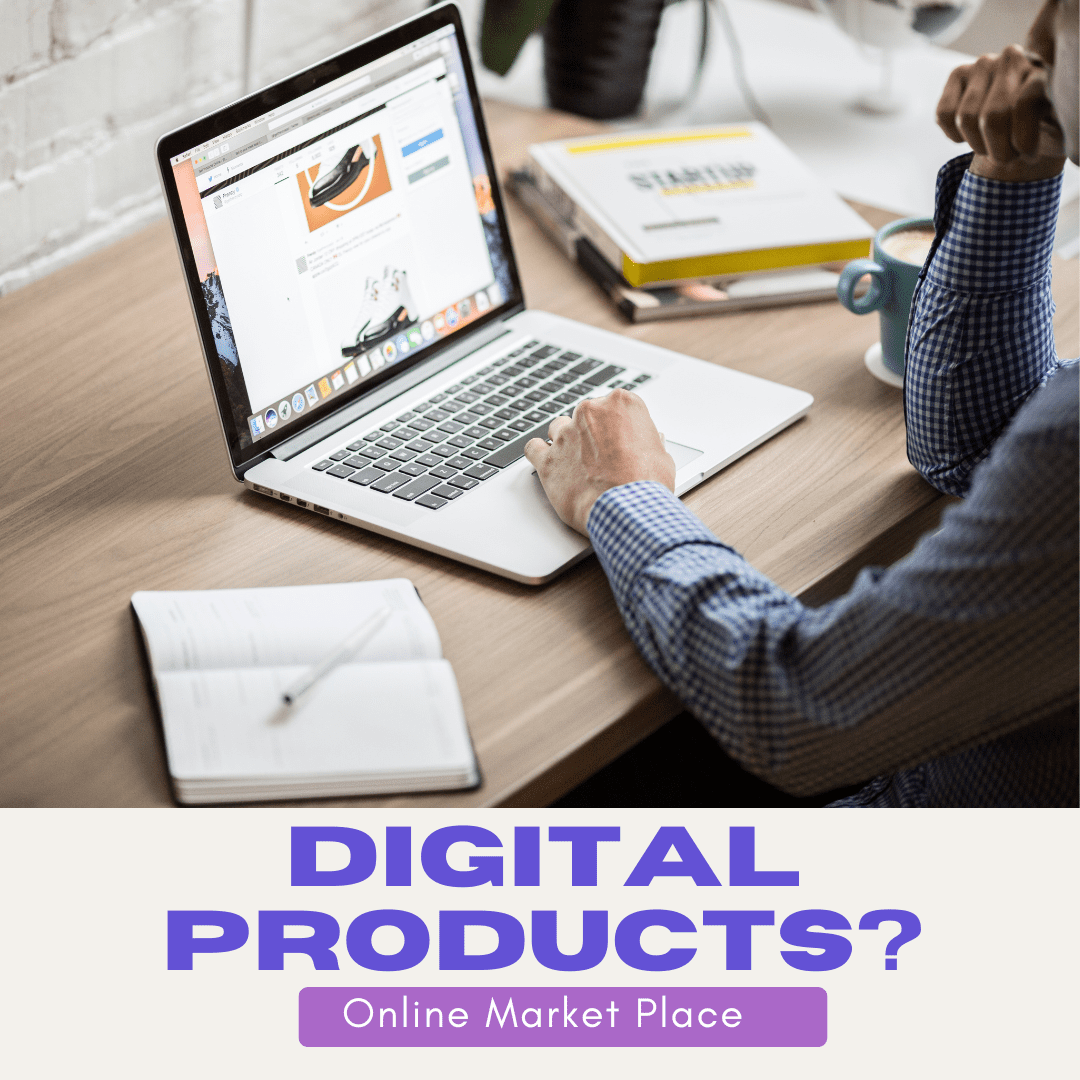Creating an online marketplace is one form of ecommerce business that can be lucrative, but it has its own particular set of difficulties. This is the ideal topic to start with if you’ve ever considered creating an online marketplace similar to those you already see, like Amazon, Etsy, or Airbnb. Learn everything there is to know about online marketplaces in this article, including how to launch, sell your digital products and successfully operate one.
What exactly are digital products? Why, then, should a businessperson focus on digital items rather than only their physical counterparts? The world in which we live is always evolving. People are earning money from a variety of endeavors, whether they start an offline or online business.
What are Digital Products?
Digital products are intangible goods or services that are created, distributed, and consumed in digital formats. Unlike physical products, which are tangible items that you can touch and hold, digital products exist solely in electronic form. They are typically delivered over the internet or through digital platforms.
These include computer programs, mobile apps, and web applications that provide specific functionalities or services. Examples include productivity software, graphic design tools, video editing software, and mobile games.
You can also turn your digital products into physical products. For example, you’re an artist who creates digital paintings and sells them as digital downloads online. You want to offer your customers the option to purchase a physical version of your artwork as a printed poster. There are lots of digital products to sell online, check this out; 101 digital products to sell to make money in 2024
What is an Online Marketplace?
An online marketplace is a platform where several retailers can offer their products or services to clients. Marketplaces on the internet include those on Amazon, Etsy, Airbnb, and eBay. Due to the abundance of vendors—hundreds of thousands, in fact—who can offer their goods to website visitors, these online shops are regarded as online marketplaces.
Online marketplaces do not sell the products and services of one brand as do traditional ecommerce sites. Online marketplaces feature a larger selection of things because there are more merchants selling their goods there, which can encourage more people to browse the website. One of the main benefits of online marketplaces is the volume of digital foot traffic they attract, which can result in better visibility for the vendors who sell there.
Online marketplaces can offer a wide variety of products and services, ranging from physical goods like electronics, clothing, and furniture, to digital products like software, e-books, and courses. Sellers on online marketplaces often have profiles that showcase their products, services, ratings, reviews, and other relevant information. This helps buyers make informed decisions.
Online marketplaces usually facilitate secure payment processing, allowing buyers to pay for their purchases using various payment methods, such as credit cards, digital wallets, or online banking.
For a number of reasons, online marketplaces are getting more popular. Firstly, customers are more inclined to believe that the platforms will shield them from dishonest sellers. Third, online marketplaces foster a sense of community where both buyers and sellers may support one another in specialized industries that are important to them. Second, online marketplaces are a handy way for merchants to earn money on goods or services they may have lied about.
Different Types of Online Marketplaces
Although they all operate in a similar way, the various types of online marketplaces have slight variations that can affect the shopping experience, the products that are sold, the customers who shop there, and the services that the online marketplace promises to provide.
Digital Product Online Marketplace
Digital products marketplaces are yet another variety of online markets. Customers no longer have to wait for their orders to be shipped and won’t have to wait to receive items one at a time from each individual seller they order from thanks to these online marketplaces that sell digital goods that can be downloaded instantly to computers or smart devices after purchase.
Physical Product Online Marketplace
Only selling actual products is the main focus of several internet marketplaces. This indicates that the sellers produce or provide physical products that must be sent to the clients who make the purchases.
Property & Spaces Online Marketplace
A different kind of online marketplace is one where buyers may buy or rent real estate, rooms, event spaces, or locations. An excellent illustration of this kind of internet marketplace is Airbnb, which allows property owners to rent out their rooms, flats, homes, or other properties globally.
To be functional and profitable, this kind of online marketplace must adhere to and manage a specific set of requirements, such as legal requirements, property insurance, and booking confirmations. If you decide to start one of these online marketplaces, make sure you understand what you’re getting yourself into because managing them can be complicated.
25 Tips on How to Start your Online Marketplace in 2025
- Market Research – Conduct thorough research to understand your target audience’s preferences, demographics, and buying behaviors. Identify trends, pain points, and unmet needs in your chosen niche.
- Niche Selection – Focus on a specific niche where there’s demand and relatively less competition. Specializing allows you to tailor your marketplace to a specific audience’s needs.
- Business Model – Choose a revenue model that aligns with your marketplace’s goals. Consider transaction fees, subscription models, featured listings, or a hybrid approach.
- Platform Selection – Select a platform that suits your marketplace’s requirements. You can use existing marketplace software or opt for custom development if needed.
- Competitor Analysis – Study your competitors’ strengths and weaknesses. Identify gaps that your marketplace can fill and find ways to differentiate yourself.
- Value Proposition – Define what makes your marketplace unique. It could be better pricing, a superior user experience, a niche focus, or innovative features.
- Seller Onboarding – Streamline the process for sellers to join and set up shop. Provide clear instructions for creating profiles, listing products, and managing inventory.
- Buyer Experience – Prioritize user-friendliness. Enable easy browsing, filtering, and searching for products. Implement a seamless checkout process.
- Trust and Safety – Implement verification mechanisms for sellers to build trust. Set up secure payment gateways and a system for resolving disputes.
- Mobile Responsiveness – Mobile optimization is crucial as a significant portion of users shop on mobile devices. Ensure your marketplace functions smoothly on various screen sizes.
- SEO Strategy – Optimize your marketplace for search engines. Use relevant keywords, create valuable content, and ensure your website’s structure is search engine friendly.
- Content Strategy – Develop a content plan to engage users. Publish informative articles, product guides, and industry insights to establish your marketplace as an authoritative source.
- Marketing Plan – Craft a comprehensive marketing strategy that encompasses social media, influencer collaborations, content marketing, email campaigns, and paid advertising.
- Social Proof – Encourage buyers to leave reviews and ratings for products and sellers. Positive social proof builds credibility and trust.
- Clear Policies – Clearly articulate your marketplace’s terms of service, refund policy, shipping policy, and any other guidelines to set clear expectations for users.
- Seller Support – Offer resources and assistance to sellers, especially those new to online selling. Provide tutorials, guides, and a responsive support system.
- Customer Support – Prioritize excellent customer service. Respond promptly to inquiries, address concerns, and resolve issues to maintain a positive user experience.
- Launch Strategy – Plan a well-executed launch with teaser campaigns, pre-launch offers, and collaborations to generate excitement and attract initial users.
- Feedback Mechanism – Create channels for users to provide feedback. Use their insights to identify areas for improvement and implement changes accordingly.
- Analytics and Insights – Utilize analytics tools to track key performance indicators (KPIs) such as conversion rates, user engagement, and sales trends. Use this data to make informed decisions.
- Scaling Plan – Anticipate growth and plan for scalability. This might involve adding new features, expanding to new markets, or optimizing your technology infrastructure.
- Partnerships – Form partnerships with influencers, bloggers, or complementary businesses to increase brand exposure and drive traffic to your marketplace.
- User Engagement – Implement strategies to keep users engaged. Personalized recommendations, introduce loyalty programs, and regularly update your offerings.
- Security Measures – Invest in robust security measures to protect user data and ensure secure transactions. Display trust seals and use SSL certificates for encryption.
- Continuous Improvement – Stay open to feedback and adapt to changing trends and user needs. Regularly update and enhance your marketplace to maintain relevance and competitiveness.
How to sell your Digital Products using an Online Marketplace
Selling digital products through online marketplaces involves strategic steps for success. Begin by selecting the right platform that aligns with your audience. Create compelling listings with high-quality visuals and clear descriptions. Price your product competitively and consider different tiers. Market your product within the platform using relevant keywords and explore paid advertising options.
Leverage social media to promote your product. Craft engaging descriptions that highlight benefits and address potential concerns. Offer free samples to entice buyers and provide exceptional customer support. Regular updates keep your products relevant, while analyzing marketplace data informs improvements. With a strategic approach, you can effectively tap into online marketplaces and drive digital product sales.
Recommend Platform to Use
We recommend that you use Vonza.com as your Online Marketplace to sell your digital products.
Vonza equips you with all the necessary tools, eliminating the need for additional apps. Sell your digital products to customers effortlessly through a single platform, both online and in person. Benefit from a robust e-commerce store, online marketplaces, and social media integration. Create and sell unlimited products and services to unlimited customers. Vonza is the only online store platform that gives you the ability to showcase video highlights of your product. Rich product display, including videos and image zoom. Everything you need to sell online and deliver items to your customers hassle-free.
Choose a unique online store design with a customizable theme to showcase your physical and digital products. Vonza’s easy-to-use drag & drop builder helps you launch your online store quickly.
Conclusion
Finally, starting an online store or marketplace is a thrilling project with a lot of potential for success in the current digital world.
Each suggestion plays a critical part in building a strong foundation for your marketplace, from comprehending your target audience and doing in-depth market research to choosing the appropriate technology platform and putting in place effective security measures. A platform can stand out by putting a high priority on user experience, encouraging trust between buyers and sellers, and utilizing efficient marketing techniques.
A seamless transaction experience is facilitated by efficient vendor onboarding, streamlined payment procedures, and a transparent pricing structure, while adding credibility-boosting features like reviews and ratings. Your marketplace will be better able to adjust to shifting market dynamics and changing client preferences if it embraces scalability, flexibility, and continual innovation.
Additionally, building a strong user base around your marketplace and actively interacting with consumers will increase customer loyalty and encourage repeat purchases. As you set out on this road, keep in mind that tenacity and patience are essential qualities because success in the online marketplace sector takes time to manifest.
Create and sell your digital products with Vonza.com. Sign up to kickstart your free trail today!




